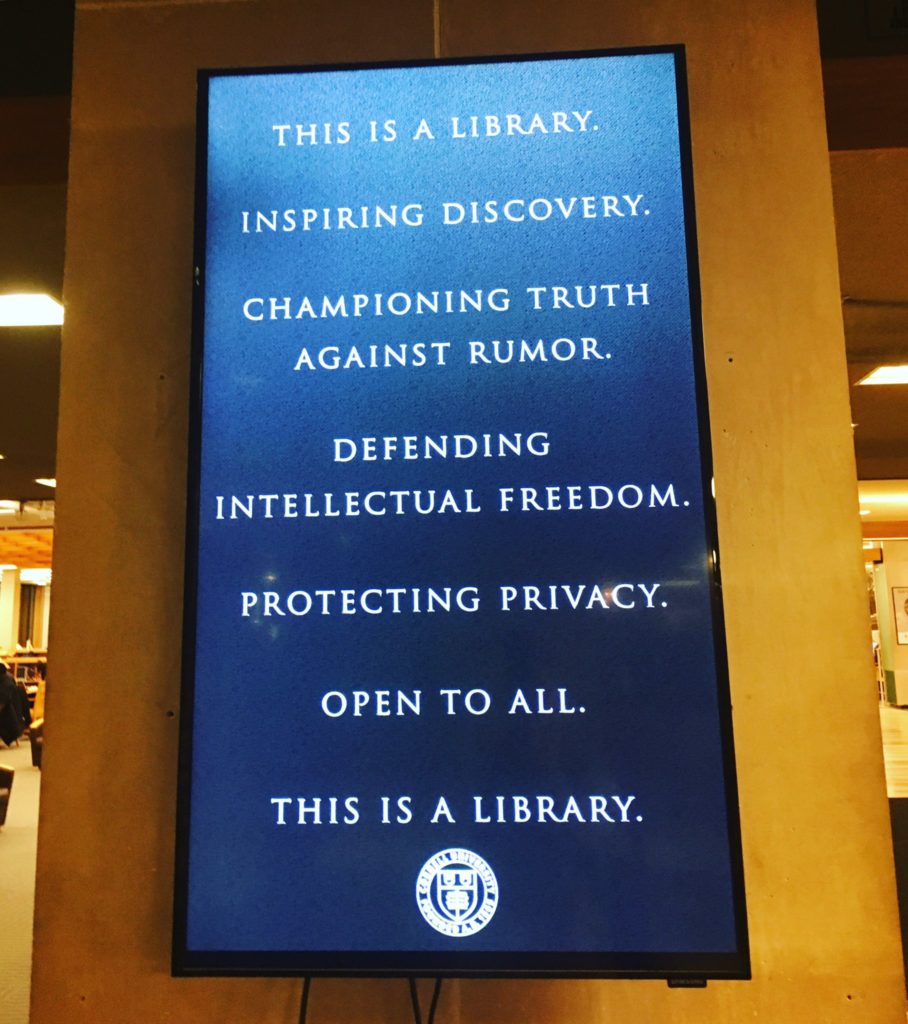Politics and academic publishing don’t usually conflict beyond what might be compared to thumb wrestling — minor tussles that are quickly and painlessly resolved. This may be because academic publishers reflect the cultures of academia and science, which are usually civil and certainly driven by open and vigorous debate. Science itself has long benefited from a well-deserved place at the head of the pack in successful societies, which also tamps down disputes before they get too large. Governments mostly support and pursue science willingly, even aggressively. As Yuval Noah Harari wrote in Sapiens: A Brief History of Humankind:
During the last five centuries, humans increasingly came to believe that they could increase their capabilities by investing in scientific research. This wasn’t just blind faith – it was repeatedly proven empirically. The more proofs there were, the more resources wealthy people and governments were willing to put into science.
These norms and assumptions are no longer certain. We live in strange times and in a bizarre political climate, unlike anything we have ever seen. Academic publishers can no longer assume they will be insulated from the shocks rippling through the system. From Brexit to Trump to white nationalists to hackers to anti-science groups, the global scientific community is under new pressures and tensions, which means its publishers are, as well, like it or not.

Our normal practice is to soldier through the storms, from SOPA to funding crises to the latest OA mandate from bureaucrats in a distant capital. But today’s storms are larger, more powerful, and growing. They won’t blow over soon, and our traditional approach may not provide sufficient shelter. Already, this week’s PSP meeting in Washington, DC, is down a speaker — the Reviewer Experience Lead at Elsevier, who was not allowed to travel to the United States owing to last week’s hastily imposed travel ban:
as an Iranian/Dutch panelist for @2017PSP-Washington I am now only able to remotely present and join the discussion on Open #peerreview https://t.co/OMsql6u7v0
— Bahar: mstdn.social/@bahar (@mehmanib) January 30, 2017
In response to the travel ban, a growing number of academics and researchers are contemplating boycotting professional meetings in the United States.
Boycotts and travel bans are bad enough, but consider these additional facts about the landscape beyond publishers, all of which were gleaned in the last week:
- Speculation that authors may soon be requesting to publish anonymously to avoid political retribution from anti-science politicians
- Rumors in the UK that EU scientists were “told to make plans to leave”
- Defunding of meetings and conferences that conflict with political beliefs of newly elected politicians
- Academics being detained at US airports as they returned to teach from their homelands, which were put on a list of banned nations unexpectedly with the stroke of a pen; physicians were also detained as they returned from abroad to help people in the US
Gag orders on scientists in the US government since the inauguration of President Trump have added to the overtones of Orwell, fascism, and authoritarianism. Further, the new US president is attempting to set himself up as the sole source of truth while stating he is at war with the free press, which is portrayed as “the opposition.” Other politicians are joining this authoritarian anthem, with Lamar Smith (R-Texas), the Chair of the House Science Committee, saying there is now a new source for truth:
Better to get your news directly from the president. In fact, it might be the only way to get the unvarnished truth.
This totalitarian view of the world, in which a single person becomes the source of facts and evidence, comes from — it bears repeating — the Chair of the House Science Committee in the United States.
We are clearly off our moorings.
From this extreme (and unacceptable) view, we have gradations, more of which seem to be emerging on the end of the spectrum we used to reserve for tin foil hats and mumblers. Now, voices raised, hair combed, and tin foil hats hidden in the pockets of nice suits, these previously fringe personalities are aggressively attacking the status quo, and science, scientists, and others find themselves on their heels.
In a time of political upheaval that threatens even the fundamental acceptance of how facts are established and how accuracy is achieved, what is our role?
Soldiering on is difficult in this environment, as it seems too mild a response to outrageous behaviors. What has been happening gradually over years is now becoming acute. It goes well beyond technical incursions like Sci-Hub, and is more existential. Science and scientific publishing have inherent political determinants, including the right to free inquiry, the right to free speech and a free press, the right to travel, and the right to assemble. Politics that seek to diminish these while imposing a predetermined world view — whether that view springs from religious doctrine, racial prejudice, political expediency, or some other source — runs directly counter to what science and scientists require to succeed.
It’s difficult to respond coherently to a communication strategy from governments that seems designed to overwhelm with shock after shock, wearing down the populace with a barrage of bizarre, worrisome, radical, and unusual stances and statements. Without the normal protocols of consultation, debate, or citation of fact, we’re in a realm of unreality. In this environment, the fundamentals of discourse — scholarly and civil — are under assault, explicitly and tacitly.
Publishers are viewed generally as part of a service industry, and we’re accustomed to providing services scholars cannot or don’t wish to take on themselves. By doing our jobs, we make researchers more efficient, saving them time and distractions via an outsourcing relationship. These are, at least, the basic tenets of the agreement. However, there are major responsibilities this perspective doesn’t acknowledge, including those involving the editorial offices we help form and support, the overall integrity of the scientific record we have a hand in establishing and defending, and the reputation for quality and evidence we have to preserve and defend. There is also the fact that a high proportion of people working in scholarly and academic publishing are former or current scientists or academics themselves, creating vast swaths of overlapping interests. Even the non-scientists working in academic and scholarly publishing are often quite passionate about the purpose and goals of science and education. There is a broad community responsibility extant in our world.
Yet, in a time of political upheaval that threatens even the fundamental acceptance of how facts are established and how accuracy is achieved, what is our role?
In some ways, the sheer economics of science provide some bulwark against mischief directly impeding the market. As Theresa May is learning, Brexit’s threats to UK science collaborations need to be dealt with proactively. But what’s happening is not limited to economics. The very underpinnings of the scientific endeavor are being actively attacked.
At the recent APE 2017 meeting in Berlin, Richard Horton of the Lancet and a panel of Scholarly Kitchen Chefs discussed these issues, along with an audience of concerned publishers. In some ways, the situation was viewed as a potential opportunity for science publishers, libraries, and researchers to come together in common cause in support of evidence, citation, truth, and freedom of thought.
Libraries may be taking the lead here, as this sign in the Olin Library at Cornell indicates:

The Association of American Universities has also been active, releasing a strongly worded statement on the day after last week’s immigration ban was put into effect. The statement reads, in part:
It is vital to our economy and the national interest that we continue to attract the best students, scientists, engineers, and scholars. That is why we have worked closely with previous administrations, especially in the wake of 9/11, to ensure our visa system prevents entry by those who wish to harm us, while maintaining the inflow of talent that has contributed so much to our nation.
Many universities have released similar statements in response to the travel ban, including the University of Chicago, Harvard University, and Johns Hopkins University. With the reputation and future of US universities deriving in large part from their ability to attract prominent scholars and promising students and researchers from around the world, the travel ban and its accompanying chilling effect threaten academia at many levels. Estimates are that the ban covering seven countries could affect as many as 17,000 students. Faculty, researchers, and other academics are not included in this estimate.
The state Attorney General for Massachusetts is expected to join an ACLU lawsuit against the ban, citing in part the harm done to the University of Massachusetts. Two Iranian nationals teaching at the University of Massachusetts at Dartmouth — Mazdak Pourabdollah Tootkaboni and Arghavan Louhghalam — were detained when they returned to the US on Saturday night. The AG from Washington State was also filing suit.
Scientists and their worldwide collaborations are also feeling threatened, and are becoming more politically active, with 400 stating interest in running for office in response to the current machinations, while a march on Washington, DC, is scheduled for some time in the next weeks. Other marches in other cities are forming with coordinated activities. The terrain is new for many, as the Executive Director of the American Geophysical Union said last weekend:
This is first time in my career I’ve seen scientists this energized and active.
So we have activist scientists, academics, librarians, and citizens. But where are the publishers in all of this?
Some are stepping up. Mary Ann Liebert, Inc., an STM publisher in New York state, has pledged to support scientists and their march by donating 5,000 pairs of “GoGreen Shoelaces for Science™” as part of a grassroots initiative to support the activists.
The Association of American University Presses (AAUP) and the Association of Research Libraries (ARL) released a statement yesterday condemning the immigration order.
In this environment, what were once normal proceedings are drawing scornful attention. The Association of American Publishers (AAP) is the focus of an open letter started earlier this week, asking them to repudiate the new US President, his administration, and their policies. Why? Simply because the AAP sent a polite letter after the election to the President-elect outlining its policy priorities and attempting to facilitate a dialogue. Standard practices no longer apply.
This seems to be a time when non-profit publishers and other university presses in particular could shine. With strong reputations, editorial and organizational leadership suffused with respected scientists, and global recognition of their brands and stances, these organizations have an opening that they have long sought. Rather than playing second fiddle to larger commercial organizations, they can step into the breach and let ‘er rip. Opportunity of an unexpected type is knocking, and the chance to re-establish their voice and role awaits. Already, statements are emerging, like this from the American Mathematical Society.
However, the strength of the reaction from publishers is a concern within such a distributed industry. Political activism is much more difficult than rallying around the DOI standard or funding something like CHORUS. It takes more resolve, alignment, and money than what we’re used to handling as an industry. However, the threat is more existential this time, it appears.
Many non-profits will tell you that their endowments or investment funds are set aside for the proverbial “rainy day.” Well, if this isn’t a rainy day, I don’t know what is.
For publishers, this moment has the potential to allow them to reboot their fraught relationships with libraries, universities, and scientists. Over the past 10-15 years, for various reasons, publishers have become misaligned with these groups, and do not seem to be viewed as part of the same team. From being portrayed as exploitative with copyright and financial models, to the inability to stop predatory publishers, to being slow to get in front of the rise in volume and costs created by emerging scientists in China and elsewhere, publishers are in a pickle.
Stepping forward in common cause with librarians, scientists, policymakers, and editors could do a lot to reset the table. Conversely, sitting on the sidelines at this crucial moment may only deepen the fissures that already exist.
I will end with a quote from a 1995 article in Science entitled, “The Politics of Science,” by John H. Gibbons, then the Assistant to the President for Science and Technology (the Trump administration has yet to name who will head the OSTP for its term, it bears mentioning). You decide if “scientists” and “publishers” are interchangeable at the beginning:
There are those who believe that scientists should stay out of politics. This is not a luxury we have; in truth, it is a luxury we never had. Each of us needs to be a partisan for science, to embrace a partisanship born of hope for the future. It is not partisanship based on party ideology but on concern over the possibility that the work of generations that has put us at the forefront of world science and technology could be undone. . . . It is a personal partisanship based on conviction, and such partisanship is the moral calling of every citizen in a democracy.
Discussion
35 Thoughts on "Scientific Publishing in a Time of Political Assaults"
This is all fine and good but the people who are being pandered to in these assaults on reasoned dialogue are forming and solidifying their attitudes in a filtered bubble. They are not reachable via the means cited here.
“Speculation that authors may soon be requesting to publish anonymously to avoid political retribution from anti-science politicians”
This is a bit ironic, given that many conservatives have felt the need to stay anonymous within the academy for years.
Tangentially, does anyone know if the OSTP public access policy is being reviewed? Is this an opportune time for the STM industry to re-engage?
Are you suggesting this would be a good time to try to limit public access to well-vetted scholarly information? Seriously?
There is the issue of potential economic damage to publishers, especially scholarly societies, of the imposed 12 month embargo. See my https://scholarlykitchen.sspnet.org/2014/01/07/estimating-the-adverse-economic-impact-of-imposed-embargoes/. Republicans might take this more seriously. There is also the issue of the Government’s claim to a right to articles the writing of which it did not pay for, which the Public Access program presently does. And of course the Administration does not share the view expressed here that somehow they are a threat to truth, or something.
Federal Use rights are a different subject than the Public Access policy. Given the positive public response to the policy, and given that the government currently has much bigger fish to fry, I’m not sure how much sympathy one would receive (especially without proof of that economic harm). And as I tried to imply above, this seems a pretty poor time for anyone who cares about science and the truth to be lobbying for a decrease in access to accurate information.
Federal use rights are the basis for the present Public Access policy, which is commandeering and publishing articles it did not pay for. It is possible that the majority of articles being published by the Federal agencies fall into this category. As for economic harm, the threat is clearly there, proven or not, based on simple economic theory, and the government often acts on mere threats. And to repeat, your view of the present Administration vis a vis science and truth is not shared by the present Administration. Thus the time may well be right for a review of the Public Access program as far as they are concerned. Bruce’s question was what the Admin is doing, not what you (or I) think about it. Public Access is indeed small stuff, but it is pretty big for OSTP so it is very likely that the new Director will take a good look at it.
Lamar Smith is a representative from Texas. Lamar Alexander is the former senator from Tennessee.
Kent
Many thanks for an amazing editorial. It would be my hope that every publisher support this by inserting a publisher’s editorial in each journal and link to this piece or take similar actions
Stefano Bertuzzi, CEO of the American Society for Microbiology, blogged yesterday about the importance of sharing scientific information across open borders. See it here: https://www.asm.org/index.php/ceo-blog/item/5826-the-dangers-of-closing-the-borders-on-global-science
Great post … the “Lamar” quote though is slightly incorrect, though. You wrote “Lamar Alexander” rather than “Lamar Smith” as the Chair of the House Science Committee, not Lamar Alexander, of course, is a Republican Senator from Tennessee.
THE HIGH ROAD What is your role? Well, if you are a for-profit publisher you have to aim at readers near the middle of the bell-curve of professional ability. Scientists are human and are attracted by hot-topics and big names, and a publisher who forgets this may find readership declining. With predatory publishers lurking in the shadows, there is less room to manoeuvre towards the highest quality of science. The same dynamic operated in the US election. The brashness of one contender doubtless increased the ratings of Fox News. The other networks with an eye on advertising revenue had no option but to follow the chase. There is plenty of blame to go round, but the inordinate attention given to that contender’s unsavoury attacks on opponents, who rightly espoused the “we go high” philosophy, is one reason we are in this mess. So, again, what is your role? Stay on course, do not panic and try to maintain the high road.
Perhaps you are lost. Articles published in scientific journals are aimed at those who are interested in the content and who for the most part have PhDs – hardly a middle of the road – knowledge wise – audience.
I do believe you are trolling in the wrong pond!
Yes, the bell-curve of professional ability is chock full of folks who are “interested in the content and who for the most part have PhDs.” Perhaps Harvey Kane thinks the highest quality of science does not come from the upper limb of the bell curve.
Lamar Smith is the Texas Representative (R) quoted. Lamar Alexander is a Senator (R) from Tennessee
If you think that Sci-Hub is just a “technical” matter, you haven’t been paying attention to the Marxist-inspired justifications that Alexandra Elbakyan has been offering to defend her enterprise.
During the policy of “ideological exclusion” of the Bush Administration we publishers spoke out. See my op-ed from 2007 in the San Francisco Chronicle when I was president of the AAUP: http://www.sfgate.com/travel/article/Promoting-democracy-while-suppressing-ideas-2520779.php
Excellent. Thank you.
Re: “Speculation that authors may soon be requesting to publish anonymously to avoid political retribution from anti-science politicians” — It’s happened before, under somewhat similar circumstances:
Indeed, the suppression of climate skeptics appears to have been widespread. That is likely to change, but may go the other way. In any case the pejorative rhetorical term “anti-science” in the present context is questionable at best.
I have been many years in the industry, not always in journals, latterly as an advocate, now winding down into administrative support so I’m not on the firing line any more and everything I say is personal. But I agree strongly with this article that we should not continue to take a non-political, “platform neutral” stance when clearly storms are breaking all over science and scientific evidence. As publishers we advocate against the tech sector for taking that approach, but are we in danger of backing off there ourselves? Surely we must step up and advocate the science that we do so much to disseminate, but aiming outside the bubble, not just within the research community?
Most of the debate that we facilitate is within the sector, that is overwhelmingly what journals are for (I can say that, but the industry can’t without attracting flak aimed at the wrong target). We should try to play our part by finding ways of carrying these truths beyond just talking to ourselves, and if that costs, so be it. It’s raining, right now. And I don’t just mean “access”- no amount of journal articles can compete with the methods used to deny science. In my (entirely personal) view the academy does and has done nowhere near enough to make what it knows understood by the great public out there, many of whom voted for Trump, as will many more now vote for other demagogues in other countries, in blissful ignorance of ‘the truth’ (I’m a Brit BTW, still wincing at the sight of our PM simpering up to your President).
Climate change denial is boneheaded, lethally aggressive to the future of our children, and runs counter to all the evidence that we publish. To renege on the Paris accord would be a crime against humanity. Somehow that message must be taken out to the people, not just to the President, his cronies, his place-men (they do seem from here to all be men), or just shared within the academy. Publishers can play a role in that, but we have to come out from behind our shield.
“Climate change denial is boneheaded, lethally aggressive to the future of our children, and runs counter to all the evidence that we publish.”
So, anyone who publishes data that contradicts your climate views should be banned, correct? I understand that Michael Mann’s much-vaunted hockey stick graph can’t be replicated from the existing data. East Anglia just happened to purge files in 2006 for no reason, right?
Maybe “all the evidence that we publish” simply means that dissenting views are not allowed. I’d much rather have a robust discussion about the concepts and data instead of deciding that one side is fake, and that only the correct people speak the truth.
I am surprised that David let this diatribe through, but in any case the climate skeptics would say that you are scaring the children unnecessarily. The climate debate is very real.
Maybe, but where can I read about the Trump Administration engaging in a “very real debate” and a “robust discussion”?
I doubt that they will engage in debate, any more than the Obama Administration did. Administrations do not debate; they push their single minded policies as hard as they can. The debate occurs elsewhere and the climate debate is easy to find.
The debate about the reality of anthropogenic climate change actually occurring, is closed for sure. The debate is about the actual process and impacts as they unroll, across space and time, to which billions of research funding is now being directed. As the IPCC report with its regional scenarios says. The hardline climate skeptics repeat a mantra of there being a ‘debate’ , as does Trump, but seriously can you have anything to do with that line, in 2017? It is absolutely tragic that the likes of Exxon are now closer to the White House, and everybody needs to be vigilant. Publishing does play a role here- keep pumping out the science which – through peer review- will of course show internal debate, but surely not overt skepticism at this late stage in understanding accumulated evidence. That would be a scandal. As an example – I am editor. I received a skeptic paper a couple of years ago. I got two rigorous reviews, both of which rejected it, and noted the absence of sound empirical content. So I rejected the paper. This is not closing down a debate, but how the journal publishing effort should work. There would be easy ways to shut down political interference in such a process – offshoring it for one. I do worry about starving science and its orgs. of Federal money though, with a knock-on effect on publishing.
DC: As someone who studies the climate debate I disagree strongly, but this is not the place to debate the debate (which is an interesting aspect of the debate). If anyone wants to see mostly the scientific debate I suggest looking here, where all sides are well represented: https://judithcurry.com/. There is also the policy debate.



